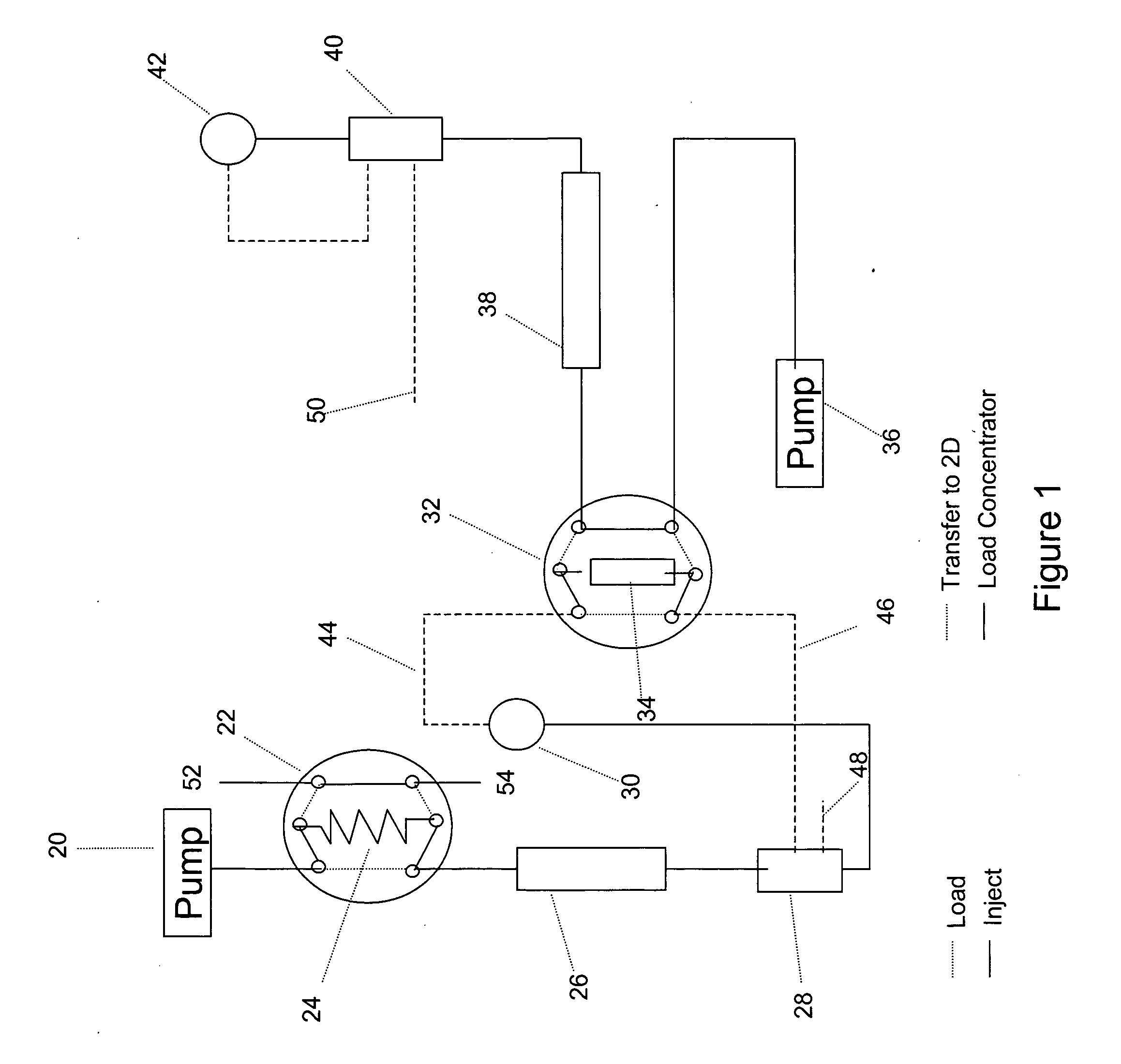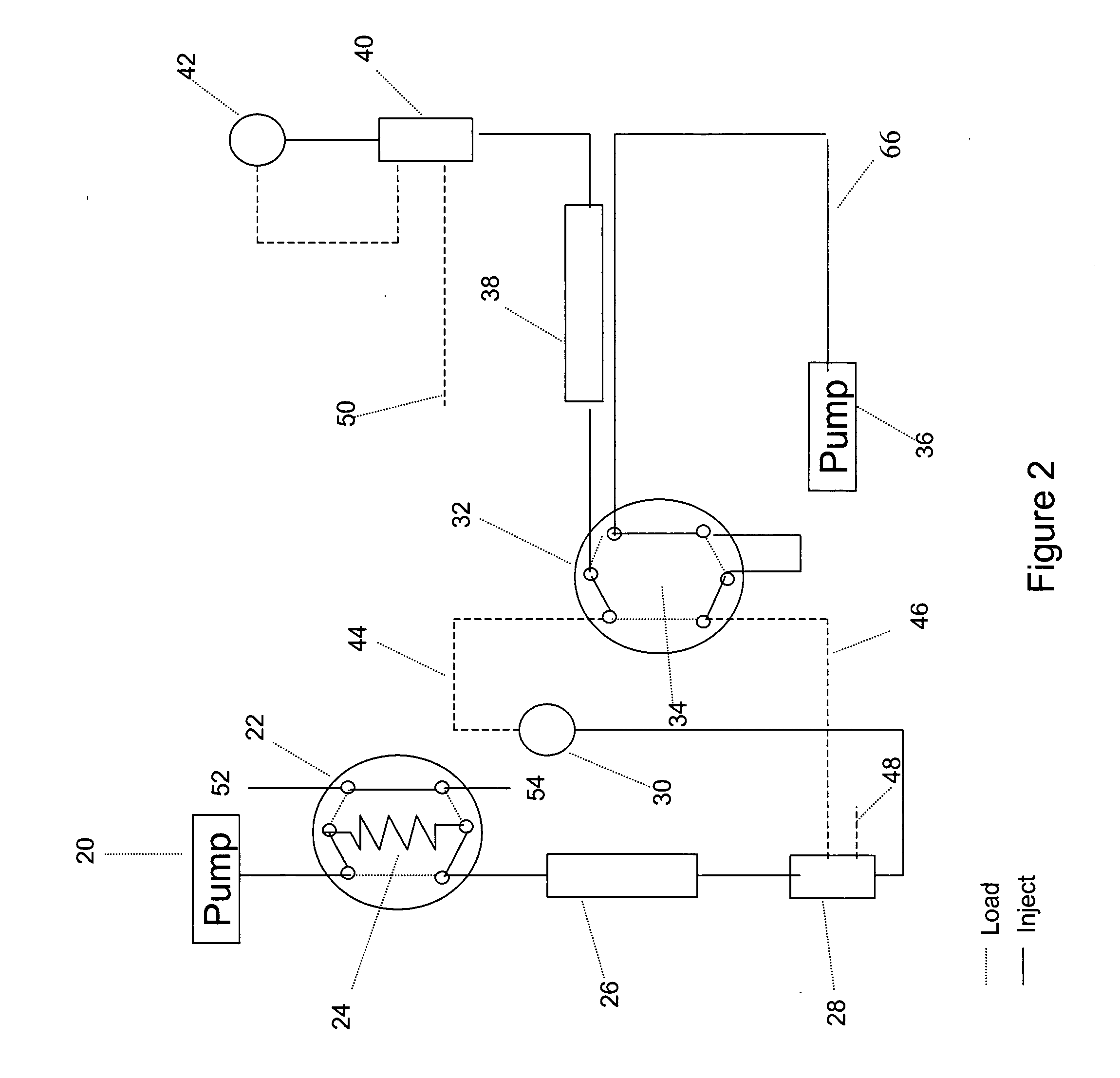Multidimensional chromatography apparatus and method
a chromatography apparatus and multi-dimensional technology, applied in the field of multi-dimensional chromatography apparatus and method, can solve the problems of loss focus or concentrate matrix ions which may not be desirable, loss of recovery of trace ions of interest,
- Summary
- Abstract
- Description
- Claims
- Application Information
AI Technical Summary
Benefits of technology
Problems solved by technology
Method used
Image
Examples
example 1
[0069] This example illustrates the limitation of prior art methodology for bromate analysis in the presence of matrix ions. A commercially available Ion chromatograph system ICS 3000 from Dionex Corporation was used for this work. The first dimension column was a 4 mm AG19 / AS19 column that was operated using a KOH gradient at 30 C as outlined below.
TimeGradient (mM)01010102545304530.1103510Matrix Concentration (ppm of Cl and SO4)A0B50C100D150E200F250
[0070] A 4 mm ASRS Ultra II suppressor was used for this work and was operated using a constant current of 113 mA. A 500 uL injection loop was used for this work. The effect of matrix concentration (NaCI and Na2SO4) on the bromate peak was studied using the first dimension setup. FIG. 5 shows an overlay of the chromatograms generated using the various matrix samples. The peak labeled 1 is a 5 ppb sample of bromate. It is clear that as the matrix concentration increased from 0 to 250 ppm, the bromate peak became wider and it was diffic...
example 2
[0072] In this example, the bromate sample was analyzed as per the present invention. The first dimension separation conditions were similar to what was outlined in Example 1.
[0073] A cut volume from about 7.5 to 9.5 minutes (2 mls) was diverted from the first dimension into a TAC-ULP1 concentrator column and the retained ions were analyzed in the second dimension using a 2 mm AG19 and AS19 column operated at 0.25 ml / min using a KOH gradient at 30 C as outlined
First dimensionSecond dimensionTime (min)Gradient (mM)Gradient (mM)01010101019.5102545304530.11034.545351045
[0074] A 2 mm ASRS Ultra II suppressor was used at 29 mA. The same bromate sample (5 ppb of bromate) from FIG. 6 was used in this work. The results indicated excellent recovery of bromate in the presence of matrix ions with no impact on peak shape as shown in FIG. 7 (Inset A is in the presence of additional matrix ions and B is in DI water).
example 3
[0075] The following table compares the peak response of 5 ppb bromate in reagent water in the first dimension versus the second dimension approach of the present invention.
Peak responseDimension(peak area)SensitivityFlow rateFirst0.006311ml / minSecond0.02443.870.25ml / min
[0076] It should be noted that the sensitivity in the above example increased roughly four fold as predicted by theory and was proportional to F the ratio of the flow rate the first dimension to the second dimension.
PUM
| Property | Measurement | Unit |
|---|---|---|
| inner diameter | aaaaa | aaaaa |
| internal diameter | aaaaa | aaaaa |
| diameters | aaaaa | aaaaa |
Abstract
Description
Claims
Application Information
 Login to View More
Login to View More - R&D
- Intellectual Property
- Life Sciences
- Materials
- Tech Scout
- Unparalleled Data Quality
- Higher Quality Content
- 60% Fewer Hallucinations
Browse by: Latest US Patents, China's latest patents, Technical Efficacy Thesaurus, Application Domain, Technology Topic, Popular Technical Reports.
© 2025 PatSnap. All rights reserved.Legal|Privacy policy|Modern Slavery Act Transparency Statement|Sitemap|About US| Contact US: help@patsnap.com



